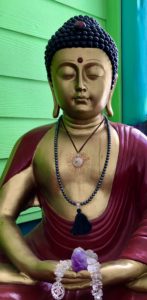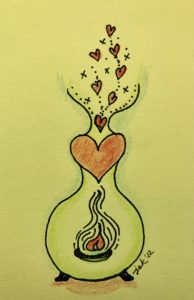
– Photo by Jan Ketchel
Beta brainwaves are active when we think, hence, they are the dominant brainwave of waking life. Typically, our consciousness is preoccupied with an internal dialogue that operates semi-consciously, as it judges, categorizes, projects possibilities, and relives lived experiences.
The subconscious mind treats the mental scenarios generated by the internal dialogue as actual facts and prepares the body to cope with their impact. Hence, the mere anticipation of an upcoming performance might generate a fear, which triggers the release of adrenalin to gear up for the challenge, as if it were happening now.
The resulting constriction in the body is accompanied by shallow breath. In fact, if one observes one’s breath when engaged with the internal dialogue, one is likely to notice both shallow upper-chest breathing and modestly long periods of holding of the breath.
These breathing patterns reinforce to the subconscious mind the presence of a danger that requires a sustained state of anxiety. The subconscious does not think rationally, it acts, based upon the body sensations and mental imaginings it is presented with.
Cognitive behavioral therapy capitalizes on this dynamic of thought-generating feeling and behavior by encouraging one to consciously control one’s thoughts. Mainstream medicine may prescribe beta blockers, a class of drugs that control the impact of adrenaline on the body, particularly the heart.
Abdominal breathing shuts down the internal dialogue, as it introduces alpha brainwaves to the body. Alpha is a restful, calm, relaxed brainwave. When in meditation, alpha is experienced as a mindful state of presence that does not attach to sensations, feelings, or mental meanderings. In alpha, one consciously removes attention from the internal dialogue.
To consciously introduce alpha brainwaves via the breath, focus on the belly for the entire breath. Allow the chest and upper chest to remain completely dormant. Imagine the belly to be a balloon that you slowly fill up to capacity, hold, and then release. Abdominal breathing is also called diaphragmatic breathing, as the diaphragm pushes downward as the balloon fills up.
Specifically, count to the count of 8 during the inhalation, hold for the count of 8, then exhale fully to the count of 8. When you complete the exhalation hold the breath for a count of 4, then repeat the pattern, beginning with an inhalation to the count of 8.
This pattern of 8-8-8-4 can be repeated for as long as one feels comfortable. Notice the resulting shift in mental, emotional, and physical states. Of course, feel free to modify the count as needed to fit your comfortability.
In fact, just practice taking a deep abdominal breath or two at any time, and notice how it breaks one’s fixation upon an anxiety-generating thought, feeling, and mental state. Achieving this calm with the introduction of alpha waves can allow for a more useful contemplation than the unnerving mental activity of the internal dialogue.
8-8-8-4,
Chuck




